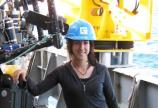Grad student explores the mysteries of the deep sea
- Shannon McCallum

When you ask Katleen ‘Kat’ Robert, a scuba diving enthusiast, what brought her to UVic to pursue her MSc degree, she says it was the irresistible pull of the ocean and the chance to study marine biology up close and personal. Little did she know that her diving experience at UVic would involve an all-day 2,100-metre trip to the bottom of the Pacific Ocean.
Robert has made history by becoming the first graduate student anywhere in the world to have completed a degree using the University of Victoria’s Ocean Networks Canada (ONC) Observatory as a primary research tool. ONC includes the NEPTUNE Canada ocean network and the VENUS coastal network.
Her deep-sea dive occurred when she joined a US-led expedition that used the submersible Alvin to install a time-lapse camera on the seafloor at one of the NEPTUNE observatory sites.
“When I arrived at UVic in January 2009, NEPTUNE was still a skeleton of fibre-optic cables,” says Robert. “The opportunity to be part of the cruises that helped bring NEPTUNE online was one of the highlights of my time here.”
She studied the ecological processes occurring in deep-sea habitats and the locomotory and burrowing behaviour of bottom-feeding organisms in response to daily, tidal and seasonal cycles.
To capture these processes and behaviours, Robert pioneered the use of remote-controlled video cameras from NEPTUNE and VENUS by developing new image acquisition and analysis protocols to match the rhythms of the organisms.
However, the wealth of data collected presented another challenge.
“Traditionally, image analysis was a qualitative process involving watching video footage and counting animals or descriptions,” she explains. “I wanted to develop a more efficient, quantitative method.”
Developing these new protocols required that Kat learn sophisticated modeling techniques, fractal analysis and advanced statistical methods.
Her supervisor, Dr. Kim Juniper, says she was more than up to the task. “Kat would decide to learn these incredibly difficult quantitative methods in order to do what she needed, and within a week she would present her first modeling results to me.”
Juniper attributes Robert’s success not only to her academic ability but also to her level of commitment. “When internet connectivity issues prevented other team members from remotely controlling one of the VENUS cameras, Kat took it upon herself to camp out in the lab for a week and woke up every couple of hours to connect to the camera for a photo.”
The calibre and potential impact of Kat’s research is hinted at by her being first author or co-author on six journal articles that have been accepted or submitted for publication. She has also received several awards while at UVic, including NSERC and Quebec government MSc scholarships and the Bob Wright Graduate Scholarship.
Kat recently began her PhD at Southampton University in the UK. She plans to continue along a similar line of research in the North Atlantic, using similar techniques to compare ecosystem processes over much wider spatial areas.
“The deep-sea ecosystems are one of the largest biomes on the planet, yet in many ways they are still a mystery,” she says. “And that’s what interests me.”

